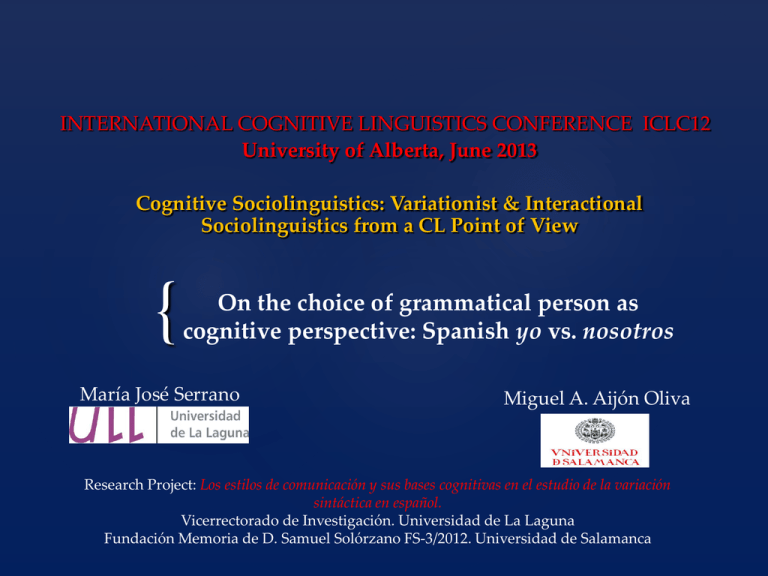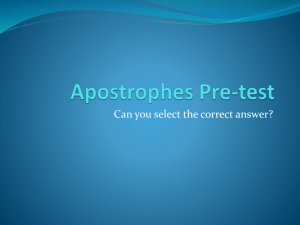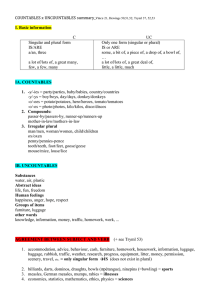Singular and plural first persons across mass
advertisement

INTERNATIONAL COGNITIVE LINGUISTICS CONFERENCE ICLC12
University of Alberta, June 2013
Cognitive Sociolinguistics: Variationist & Interactional
Sociolinguistics from a CL Point of View
{
On the choice of grammatical person as
cognitive perspective: Spanish yo vs. nosotros
María José Serrano
Miguel A. Aijón Oliva
Research Project: Los estilos de comunicación y sus bases cognitivas en el estudio de la variación
sintáctica en español.
Vicerrectorado de Investigación. Universidad de La Laguna
Fundación Memoria de D. Samuel Solórzano FS-3/2012. Universidad de Salamanca
‘Yo’ vs. ‘nosotros’. A communicative resource
Mónaco. Una historia diferente
‘Hoy por desgracia no logramos tener
buen ritmo, algo que sí solemos tener
los domingos’
www. fernandoalonso.com
The singular and plural first persons in Spanish
• Prototypical persons
• Degree of involvement of the subject referent
• Different degrees of subjectivity?
• Not just a singular and a plural form
The cognitive meanings of the singular
and plural first persons
Variation in syntax is inherently meaningful
The meaning of a syntactic choice cannot be
identical to that of its alleged alternatives
The expression and omission of subject
pronouns can be explained through the variable
salience and informativeness of their referents
The formulation of the singular first person
En cualquier caso sobre este tema (las prospecciones
petrolíferas) hay que buscar el consenso\eso es lo que yo
entiendo que hay que hacer\yo ratifico todo lo que ha dicho
Esteban\ (CCEC <Med12 BDC132>)
‘Anyway, regarding this subject [oil prospecting], consensus
must be sought. This is what I see as most necessary. I confirm
everything Esteban has said.’
The use of the singular vs. the plural
first person
Es lo que yo decía antes\en estos casos Ø estamos en acto profesional y
es necesario que Ø recurramos a los colegios profesionales\
(CCEC <Med12 BDC73>)
‘This is what I was saying before. In these cases [we] find ourselves
amidst professional duties and [we] need to resort to professional
organizations.’
Ø Digamos (digo) que hoy cualquiera quiere escribir en voz alta, hasta el
punto de que no son precisamente pocos los que, sin ningún pudor, se
lanzan al vacío con un luminoso de neón bajo sus nombres que dice
“escritor”. (MEDIASA <Art-Ga-121203-5b>)
‘[We] can say—[I] say—that these days everyone wants to write out
loud, to the point that more than a few people shamelessly dive into the
void carrying a neon sign under their names that reads writer.’
The cognitive meanings of the first persons
+ Informative
Singular first person
+Salient
Plural first person
Salience, informativeness and
markedness
Salient elements possess a less marked status and
informative elements a more marked one
Less marked elements can be expected to generate
a wider range of meanings; higher markedness will
mean focusing on the particular referent
Yo is generally more marked than nosotros
Corpora and methodology
Corpus Conversacional del
Español de Canarias (CCEC)
Spontaneous conversations
(79,544 words)
Corpus de Lenguaje de los
Medios de Comunicación de
Salamanca (MEDIASA)
Oral and written mass-media
texts
Oral mass-media texts
(171,258 words)
(302,577 words)
• Relative variables
• Absolute variables
Spontaneous conversations.
Indexing the speaker
Items
Frequency
Singular first person
820
103.1
Plural first person
246
30.9
Absolute frequency of singular and plural first-person subjects
in spontaneous conversations (CCEC)
Spontaneous conversations.
Indexing the speaker
Yo me encuentro bastante bien\yo no sé si es por eso porque Ø me tomé un
tranquimazín\pero yo me encuentro bastante bien (CCEC Conv
<ElEn08>)
‘I feel quite well. I don’t know if it’s because [I] took a tranquilizer, but I
do feel quite well.’
Ø Decidimos acatar los plazos de las residencias de Las Palmas, Ø
recogimos las firmas, Ø presentamos el escrito que estaban pidiendo y se
lleva a cabo la primera reunión (CCEC Conv <ElEn08>)
‘[We] decided to comply with the deadlines fixed by the residences in
Las Palmas, [we] collected signatures, [we] submitted the statement they
demanded, and then the first meeting was held.’
Singular and plural first persons in
spontaneous conversations
Expression
Items
Freq.
Omission
Items
Freq.
Total
Singular first
person
382
48.2
468
58.8
850
Plural first
person
41
5.1
205
25.7
246
Absolute frequency of expressed and omitted singular and plural
first-person subjects in spontaneous conversations (CCEC)
Transactional and interpersonal
communicative stances
[Transactional]
Nosotros en esta reunión no teníamos noticia de que eso fuera legal\ porque
cuando se toman acuerdos a nivel general/ tiene que haber acuerdo con la
empresa\ (CCEC Med12 <ElEn08>)
‘At the time of that meeting we were not aware that such a procedure was
legal. Because whenever general agreements need to be made, compliance
with the company is mandatory.’
[Interpersonal]
Yo estoy trabajando en una escuela de inmigrantes menores\ Ø estuve en
una escuela de idiomas\pero Ø llevo dos semanas en la escuela de
inmigrantes (CCEC Conv<ElEn08>)
‘I’m working at a school for immigrant children. [I] used to work at a
language school, but [I]’ve been at this immigrant school for two weeks
now.’
Transactional and interpersonal
communicative stances
Stance
Singular first person
Plural first person
Items
Frequency
Items
Frequency
Transactional
293
93.3
105
33.4
Interpersonal
557
115.6
141
29.2
Total
850
103.1
246
30.9
Absolute frequencies of singular and plural first
persons according to speaker communicative stance
in spontaneous conversations (CCEC)
Singular and plural first persons in
mass-media discourse
Items
Frequency
Singular first person
1180
68.9
Plural first person
1512
88.2
Absolute frequency of singular and plural first-person subjects
in mass-media texts (CCEC)
Items
Frequency
Singular first person
2165
71.6
Plural first person
2659
87.9
Absolute frequency of singular and plural first-person subjects
in mass-media texts (MEDIASA)
Singular and plural first persons in
mass-media discourse
Expression
Items
Omission
Freq.
Items
Freq.
Total
Singular first
person
654
38.1
526
30.7
1180
Plural first
person
117
6.8
1395
81.4
1512
Absolute frequency of expression and omission of singular and plural
first-person subjects in mass-media texts (CCEC)
Expression
Items
Freq.
Omission
Items
Singular first
person
569
18.8
1596
Plural first
person
96
3.1
2563
Freq.
Total
52.7
2165
84.7
2659
Absolute frequency of expression and omission of singular and plural
first-person subjects in mass-media texts (MEDIASA)
Singular and plural first persons
across mass-media genres
Genre
Singular
Plural
Items
Freq.
Items
Freq.
Magazines
345
56.2
432
70.4
Informational
debates
494
118.3
319
76.4
Talk shows
127
100.1
87
68.5
News reports
214
38.5
674
121.4
1180
68.9
1512
88.2
Total
Absolute frequency of singular and plural first-person
subjects according to textual genre in mass-media texts
(CCEC)
Singular and plural first persons
across mass-media genres
[Informational debate]
Yo quería insistir en el punto que ha hablado Carmen\ se trata de
imitar el modelo de Aena\ que es lo que ha provocado el anuncio de
huelga\ (CCEC Med12<ElEnv103>)
‘I would like to insist on the point made by Carmen. This is all about
imitating the Adena model that prompted the strike call.’
[Talk show]
Yo vendo las fresas aquí\con todo el trabajo de plantarlas y recogerlas y
luego Ø las traigo al supermercado\ (CCEC Med12<R72010>)
‘I sell strawberries here, together with the tasks of planting and
collecting them, and then [I] bring them to the supermarket.’
Singular and plural first persons
across mass-media genres
[News reports]
Domingo 11 de diciembre Ø tenemos estas noticias y otras que
contarles\ Ø sepamos a esta hora de la noche cómo se encuentran las
carreteras\ Ø nos encontramos en plena operación retorno\ (CCEC
Med12 <CanDi1112>)
‘Sunday, December 11th. [We] have these stories as well as others to
tell you. Let [us] now get an update on traffic conditions. [We] are in
the middle of the back-from-vacation operation.’
[Informational debate]
Ø Estamos confundiendo el objetivo con el camino y la gran diferencia es
que nosotros estamos al 29% de paro\ pero es que Canarias no puede
prescindir de los planes de empleo ni de las infraestructuras\
(CCEC Med12 <ElEnv2710>)
‘[We] are mistaking the goal for the path to achieve it. The big difference is
that we have a 29% employment rate. But the fact is that the Canary Islands
cannot do without employment plans and infrastructures.’
Singular and plural first persons
across mass-media genres
Genre
Opinion pieces
Letters to the editor
News items
Stories
Interviews
Written-press total
Commercials
News reports
Sport programs
Music programs
Magazines
Radio total
Singular first person
Plural first person
Items
Frequency
Items
Frequency
207
144
69
73
216
709
34
68
474
109
771
1456
68.7
94.7
11.6
24.1
141.3
47.1
22.3
37.5
134.6
52.2
123.6
95.8
206
122
99
66
145
638
141
196
349
297
1038
2021
68.4
80.3
16.6
21.8
94.8
42.4
92.6
108
99.1
142.1
166.3
133
Absolute frequencies of singular and plural first-person subjects
according to textual genre in mass-media texts (MEDIASA)
Singular and plural first persons
across mass-media genres
[Opinion piece]
Como le sucedía al coronel del cuento de García Márquez, Ø no tengo quien
me escriba. Ø Me refiero que [sic], a diferencia de otros columnistas que
presumen de correspondencia copiosa, a mí los lectores no me dicen ni
palabra. (MEDIASA <Art-Ga-091204-5a>)
‘As happened with the colonel in García Márquez’s tale, [I]’ve got no one to
write to me. [I] mean, unlike other columnists who boast their copious
incoming mail, my readers don’t send me a word.’
[Commercial]
ahora no tienes excusa: / por llevar el coche sucio en Autolavado Los Olivos
/ viernes sábado y domingo / Ø festejamos nuestra ina(u)guración / y Ø te
lavamos tu coche / ¡gratis! (MEDIASA <Anu-Di-200503-12:30>)
‘You have no excuse anymore. Just to celebrate our opening, if you bring
your dirty car to the Los Olivos washing station from Friday to Sunday
[we]’ll wash it for free!’
Singular and plural first persons
across socioprofessional ascriptions
Journalists
Politicians
Public
figures
Private
individuals
Singular and plural first persons
across socioprofessional ascriptions
Group
Singular first person
Plural first person
Items
Freq.
Items
Freq.
Journalists
302
47.3
725
113.7
Public figures
193
41.3
302
64.7
Politicians
532
138.7
320
83.4
Private
individuals
153
67.9
165
73.2
Total
1180
68.9
1512
88.2
Absolute frequencies of singular vs. plural first-person
subjects according to speaker socioprofessional ascription in
mass-media texts (CCEC)
Singular and plural first persons
across socioprofessional ascriptions
[Informational debate, politician]
Esa ha sido la decisión y yo como miembro del gobierno la
respaldo\pero yo sí creo que todo el mundo puede entender la decisión
que este gobierno ha tomado\y yo ya no voy a entrar en la valoración
de esa decisión\ (CCEC Med12<ElEnv103>)
‘That is the decision made and I need to endorse it as a member of the
Government. But I do think that everyone can understand such a
decision, and I won’t undertake any evaluation of it.’
[Talk show, journalist]
Yo aplaudo al gobierno\yo aplaudo al gobierno aunque sea una
obscenidad aplaudir a un gobierno\yo aplaudo a la oposición\
(CCEC Med12<TertPe2612>)
‘I applaud the Government, even if applauding a government may be
considered obscene. I applaud the opposition.’
Singular and plural first persons
across socioprofessional ascriptions
Group
Singular first person
Plural first person
Items
Freq.
Items
Freq.
Journalists
493
27
1140
62.4
Public figures
983
141.7
888
128
Politicians
241
101.1
362
151.9
Private
individuals
448
168.5
269
101.2
Total
2165
71.6
2659
87.9
Absolute frequencies of singular vs. plural first-person
subjects according to speaker socioprofessional ascription
in mass-media texts (MEDIASA)
Singular and plural first persons
across socioprofessional ascriptions
[Private individual]
uno de los recuerdos que tengo yo: / precisamente / es / e / e: / N:O
estando en la Plaza Mayor sino estando a: ochocientos kilómetros de
Salamanca / aprosimadamente / un año que Ø estuve: trabajando e:n:/ en Andorra // y::- / y: el:- / e:s uno de los recuerdos así gratos que Ø
tengo / y de cuánto se puede echar de menos / a la Plaza Mayor
(MEDIASA <Var-SE-011204-13:20>)
‘One of the memories I keep is actually not from the Salamanca
major square, but rather from some 800 kilometers away—[I] spent
a year working in Andorra. It’s one of the most cherished memories
[I] keep, and it shows how much one can miss the square.’
Singular and plural first persons
across socioprofessional ascriptions
[Politician]
Pero el grado de satisfacción de los ciudadanos, que son los que
determinan si se gobierna bien o mal, se demuestra en el resultado de las
elecciones, y Ø hemos ganado con claridad las cuatro que ha habido en
los últimos años. Así que la autocrítica Ø la haremos partiendo de un
hecho positivo: que los ciudadanos nos entienden, valoran nuestra
gestión, les gusta lo que Ø hacemos; pero a pesar de todo Ø no nos
conformamos y Ø queremos más. (MEDIASA <Ent-Ad-131104-17>)
‘But the degree of satisfaction on the part of citizens—who are the ones
to decide whether one has ruled well or not—is shown by election
results, and [we] have clearly won the last four elections held. So [we]’ll
undertake self-criticism starting from a positive fact—that the citizens
understand us, they value our policies, they like what [we] do. But, in
spite of this all, [we] are not yet satisfied; [we] want more.’
Conclusions
The singular first person is the more frequent one in
spontaneous conversations. It is particularly dominant when
speakers adopt interpersonal stances
In mass-media texts, the singular is used when focusing on
personal experiencies and opinions (informational debates
and oral interviews in CCEC; interviews and letters to the
editor in the written-press section of MEDIASA)
The plural achieves higher frequencies of use whenever it is
advantageous to blur the presence of the particular speaker
(news reports in both corpora, music programs and
magazines in MEDIASA)
Conclusions
Politicians and private individuals are more inclined
to choosing the singular first person
Journalists show a preference for the plural, which
seems to help them reduce the suggestion of personal
responsibility
Each of the syntactic choices studied, through the
deictic involvement of one or more referents in the
clause subject, may serve different communicative
goals and help create different stylistic meanings





